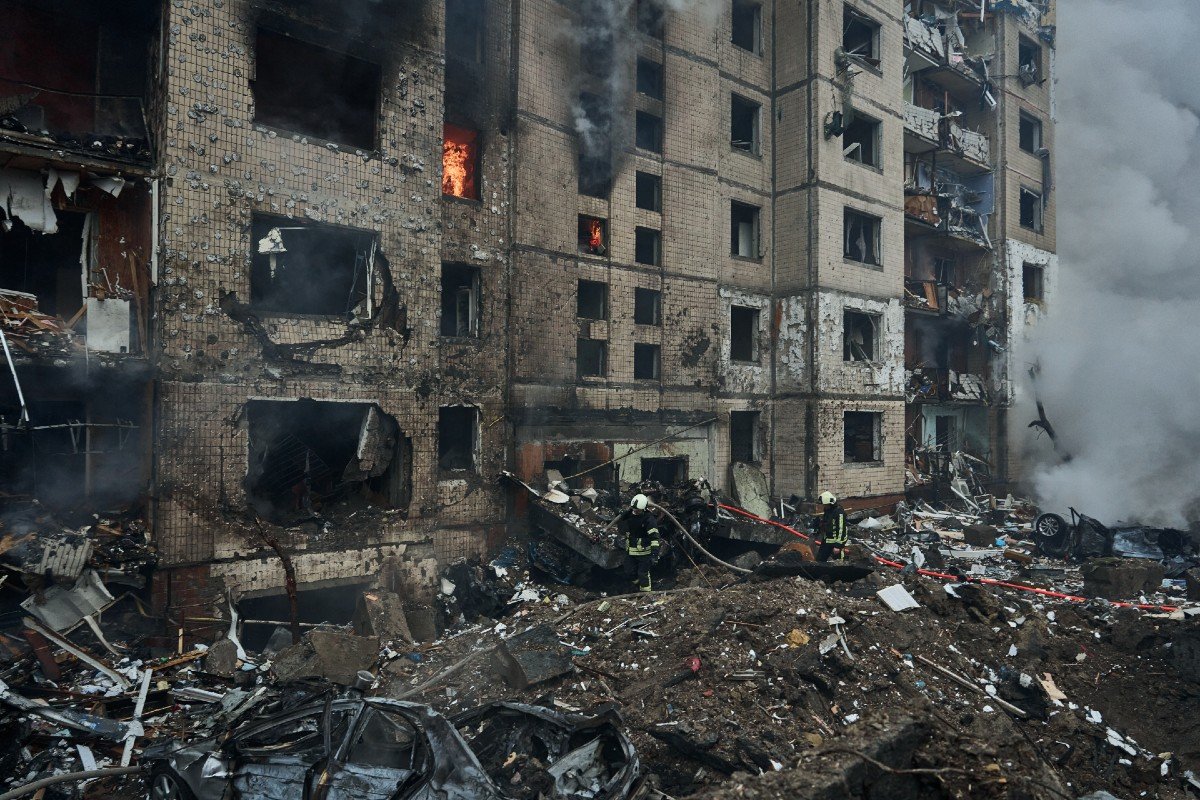Russia is attempting to disguise details about its cruise missile production and stockpiles, according to a new report, after Moscow launched devastating large-scale strikes across Ukraine on consecutive days.
Ukrainian outlet Defense Express reported on Tuesday that missiles used in a Russian aerial assault in the early hours of January 2 were manufactured in the last few months of 2023. Serial numbers found on recovered cruise missiles are "cryptic" and "deliberately difficult to decipher," the outlet reported.
Ukraine's military said on Tuesday that Russia had launched a "massive" air attack across the country, with Ukrainian air defenses shooting down all 10 hypersonic Kinzhal missiles and three Kalibr cruise missiles. Moscow also launched 70 of its Kh-101, Kh-55 and Kh-555 cruise missiles, 59 of which Ukraine intercepted, according to Kyiv's armed forces.
Ukrainian officials compared the January 2 waves with Russia's missile onslaught on December 29, when Ukraine's air force said it shot down 86 Kh-101, Kh-55 and Kh-555 missiles. Ukraine has weathered waves of missile barrages on several days since December 29, with Russia firing hundreds of missiles of various types.
Defense Express looked at the remains of the Kh-101 cruise missiles, and argued that Moscow is attempting to change the serial numbers on the missiles to "to hide as much as possible" where the components used to make the missiles have come from.

Russia has been under swathes of sanctions that Ukraine's Western backers had hoped would stymie Russia's ability to keep producing missiles. Ukraine has been vocally critical of Western parts continuing to find their way into Russian missiles wreaking havoc on Ukraine, including in Kalibr cruise missiles.
Experts told Newsweek back in July that Russia will continue to benefit from Western technology embedded in its weapons striking Ukraine as efforts to trip up Moscow's war machine fail to stop weapons production.
Disguising serial numbers on missiles like the Kh-101 could be an effort to stop Ukraine finding any data that would help Kyiv piece together information about Russian production numbers and rates, as well as how many missiles are in Moscow's stockpile, Fabian Hinz, a research fellow with the International Institute for Strategic Studies think tank, told Newsweek.
It may be a way to mask Russia's current rate of missile production, versus how quickly Moscow is going through missiles, added Gary Somerville, a research fellow with the Open-Source Intelligence and Analysis Research Group at the London-based think tank, the Royal United Services Institute.
"We already know that the Kh-101s that have been produced after the 2022 invasion began have undergone some notable technological improvements so that it is easy to tell the difference between the two iterations," he told Newsweek. "We have seen instances of components being used in Russian weapons where serial numbers or branding have been removed or attempts have been made to remove them, but this has not been consistent across the various platforms."
Newsweek has reached out to the Russian Defense Ministry for comment via email.
Western analyses generally suggest that Russia is not on the brink of running out of missiles, and had eased up on missile salvos ahead of winter to conserve its stocks. Moscow has also widely supplemented its missile salvos with one-way strike drones, like the Iranian-designed Shahed-131 and larger -136 to hit Ukrainian cities, energy infrastructure and defense facilities.
On Wednesday, the British Defense Ministry said Russia had intensified its long-range strikes on Ukraine in recent days, committing a "significant proportion of the stock of air-launched cruise missiles and ballistic missiles they had built up over recent months."
"Russia has been using its missiles sparingly and should again have accumulated a decent stock of them," Frederik Mertens, a strategic analyst with the Hague Centre for Strategic Studies, told Newsweek in late October.
But Russia has veered towards targeting Ukraine's military-industrial complex, rather than the energy infrastructure it hammered in the first full winter of all-out war, the U.K. government said on Wednesday.
Ukraine had braced itself for intensified strikes over the coldest months, upping its calls for air defense systems from its allies. "As winter approaches, there will be more Russian attempts to make the strikes more powerful," Ukrainian President Volodymyr Zelensky warned in mid-November.
The intensive waves of strikes on consecutive days on the cusp of and into the new year have maintained pressure on these Ukrainian air defense systems.
But the December 29 attack cost Russia in excess of $1.2 billion, one Ukrainian outlet estimated shortly after the missile blitz.
Ukraine responded to the December 29 strikes with what Russia called an "indiscriminate combined strike" on the Russian border city of Belgorod. Moscow then said it had retaliated with another round of strikes, including an assault on "decision-making centers and military facilities" in Kharkiv. The Kremlin said its missiles killed members of Ukraine's intelligence services and its military who "were directly involved in the planning and execution of the terrorist attack in Belgorod."
Ukraine has since reported rounds of missile strikes, although Kyiv's military said on Thursday that Russia had launched only seven missiles over the past 24 hours—a significant dip from previous days.
Update 01/08/24, 11:30 a.m. ET: This article was updated to include additional comments from Gary Somerville.
Uncommon Knowledge
Newsweek is committed to challenging conventional wisdom and finding connections in the search for common ground.
Newsweek is committed to challenging conventional wisdom and finding connections in the search for common ground.
About the writer
Ellie Cook is a Newsweek security and defense reporter based in London, U.K. Her work focuses largely on the Russia-Ukraine ... Read more





